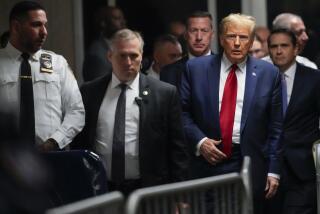Judge Orders Noriega Trial to Begin Week of March 5
- Share via
MIAMI — In a surprise move, U.S. District Judge William M. Hoeveler on Wednesday ordered the drug-trafficking and money-laundering trial of deposed Panamanian dictator Manuel A. Noriega and a raft of co-defendants to begin the week of March 5, but he left open the possibility of postponements.
Hoeveler fixed the trial date after attorneys for Lt. Col. Luis A. del Cid, one of Noriega’s co-defendants, invoked the federal “speedy trial” statute that requires court proceedings to begin within 70 days of arraignment.
The action was taken following a two-day bail hearing in which much of the government’s case against Del Cid, the former commander of Panamanian military forces in the province of Chiriqui, near the Costa Rican border, seemed uncertain.
“You want to go to trial quickly, and you are entitled to go to trial quickly,” Hoeveler told Del Cid’s lawyers.
Noriega’s lawyer, Frank Rubino, who was in the courtroom at the time, later told reporters: “I’m as shocked as you are. . . . I told the judge I’d be ready (for the trial) in nine months or a year.”
Hoeveler indicated that he probably would postpone the trial if asked to do so by Noriega or any of the other defendants. But he noted that Del Cid could be tried separately. Del Cid previously asked to be tried alone, but Hoeveler has not yet ruled on the motion.
The Del Cid bail hearing provided the first courtroom test of the case against one of Noriega’s associates. Hoeveler agreed to give Noriega’s lawyers, Samuel I. Burstyn and Kenneth Swartz, 10 days to respond to assertions made late Wednesday by federal prosecutor Myles Malman. He will not announce his decision on bail for Del Cid until he hears the response.
Under the relaxed rules that apply to bail hearings, attorneys for both sides outlined for the judge the evidence they could present without being required to prove their assertions.
Even so, significant factual portions of the prosecution case seemed shaky during the hearing. Although indictments against Noriega, Del Cid and the other co-defendants were returned almost two years ago, the government seemed uncertain of the facts it hopes to prove.
In a Jan. 2 hearing, Malman had said the U.S. government was prepared to show that Del Cid was former chief of intelligence for Noriega’s Panama Defense Forces. On Wednesday, though, Malman conceded that Del Cid had never held the intelligence post.
“When I said Del Cid was head of (intelligence), I misspoke, but I misspoke in favor of the defendant and not the government,” Malman said, contending that Del Cid was more powerful than the intelligence chief.
Later in the hearing, Malman said the intelligence post was held by Luis A. Cordoba, and that “Cordoba and Del Cid were close.” Burstyn, however, said the friend of Cordoba actually was a Mario del Cid, not his client. Malman did not contest the assertion.
At the Jan. 2 hearing, Malman also had asserted that Del Cid surrendered his troops in Chiriqui province to invading U.S. forces only after military defeat was inevitable and after Noriega had also given up the fight.
Swartz said Wednesday that Del Cid had telephoned the U.S. Southern Command early in the invasion with an offer to surrender to avoid needless bloodshed.
“The surrender was not done at gunpoint; it was done over long-distance telephone,” Swartz said.
Later, Malman acknowledged that Del Cid offered to surrender Dec. 22, before Noriega sought refuge in the Vatican embassy and at a time when there were no U.S. troops in his province. The actual surrender came three days later, when the first American forces arrived, Malman said.
The hearings were marked by an extraordinary degree of rancor between Burstyn and Malman. Each man peppered his argument with sarcastic references to the other.
More to Read
Sign up for Essential California
The most important California stories and recommendations in your inbox every morning.
You may occasionally receive promotional content from the Los Angeles Times.













